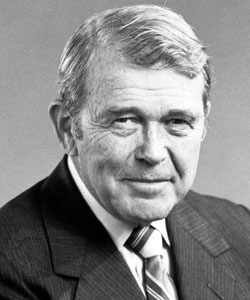
William Redington Hewlett was an American engineer and the co-founder, with David Packard, of the Hewlett-Packard Company (HP).

Agilent Technologies, Inc. is a global company headquartered in Santa Clara, California, that provides instruments, software, services, and consumables for laboratories. Agilent was established in 1999 as a spin-off from Hewlett-Packard. The resulting IPO of Agilent stock was the largest in the history of Silicon Valley at the time. From 1999 to 2014, the company produced optics, semiconductors, EDA software and test and measurement equipment for electronics; that division was spun off to form Keysight. Since then, the company has continued to expand into pharmaceutical, diagnostics & clinical, and academia & government (research) markets.

Lewis Emmett Platt was an American businessman and corporate director, who was chairman, president and chief executive officer of Hewlett-Packard.

The USC Viterbi School of Engineering is the engineering school of the University of Southern California. It was renamed following a $52 million donation by Andrew J. Viterbi, co-founder of Qualcomm.

HP Labs is the exploratory and advanced research group for HP Inc. HP Labs' headquarters is in Palo Alto, California and the group has research and development facilities in Bristol, UK. The development of programmable desktop calculators, inkjet printing, and 3D graphics are credited to HP Labs researchers.

The Hewlett-Packard Company, commonly shortened to Hewlett-Packard or HP, was an American multinational information technology company headquartered in Palo Alto, California. HP developed and provided a wide variety of hardware components, as well as software and related services to consumers, small and medium-sized businesses (SMBs), and large enterprises, including customers in the government, health, and education sectors. The company was founded in a one-car garage in Palo Alto by Bill Hewlett and David Packard in 1939, and initially produced a line of electronic test and measurement equipment. The HP Garage at 367 Addison Avenue is now designated an official California Historical Landmark, and is marked with a plaque calling it the "Birthplace of 'Silicon Valley'".
Maja Matarić is an American computer scientist, roboticist and AI researcher, and the Chan Soon-Shiong Distinguished Professor of Computer Science, Neuroscience, and Pediatrics at the University of Southern California. She is known for her work in human-robot interaction for socially assistive robotics, a new field she pioneered, which focuses on creating robots capable of providing personalized therapy and care that helps people help themselves, through social rather than physical interaction. Her work has focused on aiding special needs populations including the elderly, stroke patients, and children with autism, and has been deployed and evaluated in hospitals, therapy centers, schools, and homes. She is also known for her earlier work on robot learning from demonstration, swarm robotics, robot teams, and robot navigation.
Stratagene California was an American biotechnological company based in La Jolla, California, a maker of life science research and diagnostic products. It was established in 1984 and incorporated in California. It has been involved with the fields of cellular analysis, cloning, cytogenomics, DNA methylation and DNA Sizing and Quantification and food testing. In 2007, Agilent Technologies acquired Stratagene for $250 million, spinning off certain business assets and licensing certain molecular diagnostics technology to a new entity, Decisive Diagnostics. As of October 2011, the Chief Executive of the new company is Joseph Sorge, original founder and CEO of Stratagene.
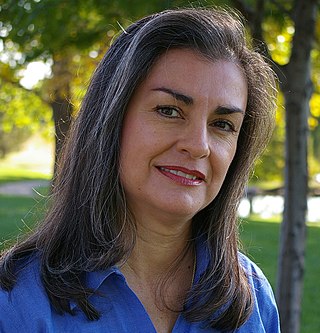
Patricia Diane Lopez is an American computer scientist noted for her research on computer vision, image processing, and image enhancement. Her most notable work is her early efforts on neural networks, modeling human vision and imaging patents.
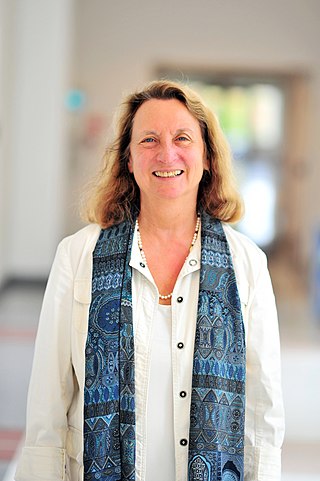
Elaine Surick Oran is an American physical scientist and is considered a world authority on numerical methods for large-scale simulation of physical systems. She has pioneered computational technology to solve complex reactive flow problems, unifying concepts from science, mathematics, engineering, and computer science in a new methodology. An incredibly diverse range of phenomena can be modeled and better understood using her techniques for numerical simulation of fluid flows, ranging from the tightly grouped movements of fish in Earth's oceans to the explosions of far-flung supernovae in space. Her work has contributed significantly to the advancement of the engineering profession.
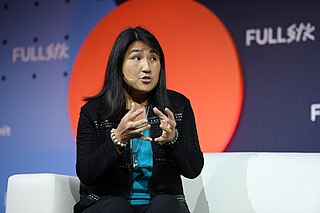
Susie J. Wee is an American technology expert. In 2011, she became the Vice President and Chief Technology and Experience Officer (CTEO) of Collaboration at Cisco Systems. In 2018, she became the Senior Vice President and Chief Technology Officer of Cisco DevNet, which she founded in 2014. Wee is a WITI Hall of Fame inductee.
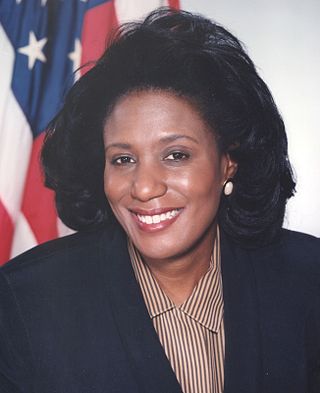
Cheryl L. Shavers is an American chemist, engineer, and businesswoman. After gaining a degree in chemistry, she worked as an engineer at Motorola. Shavers returned to university for a few years, gaining a PhD in solid state chemistry, before returning to private industry. Shavers worked at increasingly senior levels in Silicon Valley, at Hewlett Packard and Intel. She served as Under Secretary of Commerce for Technology in the Clinton Administration (1999–2001), and is a registered patent agent in the US Patent and Trademark Office. After leaving government service in 2001, she established a consultancy and strategy business, Global Smarts Inc. Shavers was inducted into the Women In Technology International (WITI) Hall of Fame and the Hall of Fame of the Arizona State University's College of Liberal Arts and Sciences.
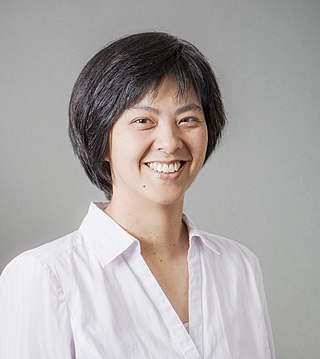
Ellis Meng is the Shelly and Ofer Nemirovsky Chair of Convergent Biosciences and Professor of Biomedical Engineering and Electrical and Computer Engineering in the Viterbi School of Engineering at the University of Southern California, where she also serves as the Vice Dean of Technology Innovation and Entrepreneurship. Meng is highly decorated in the development of novel micro- and nanotechnologies for biomedical applications. In 2009, Meng was named on MIT Technology Review's "Innovators Under 35" List for her work on micropumps that deliver drugs preventing blindness, and she was listed on the 40 Under 40 List of the Medical Device and Diagnostic Industry (MDDI) in 2012.

Andrea Martin Armani is the Ray Irani Chair in Engineering and Materials Science and professor of chemical engineering and materials science at the USC Viterbi School of Engineering. She was awarded the 2010 Presidential Early Career Award for Scientists and Engineers from Barack Obama and is a World Economic Forum Young Global Leader.
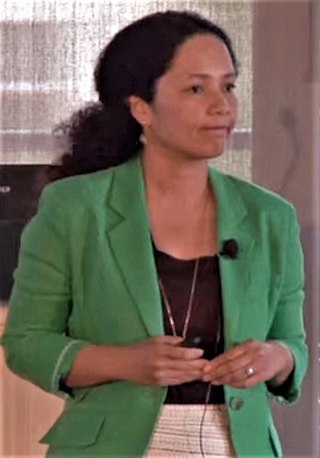
Debbie Senesky is an associate professor of Aeronautics at Stanford University. She is the principal investigator of the EXtreme Environment Microsystems Laboratory, and studies nanomaterials in extreme environments.
Maryam M. Shanechi is an Iran-born American neuroengineer. She studies ways of decoding the brain's activity to control brain-machine interfaces. She was honored as one of MIT Technology Review's Innovators under 35 in 2014, one of the Science News 10 scientists to watch in 2019, and a National Finalist for the Blavatnik Awards for Young Scientists in 2023. She is Dean's Professor in Electrical and Computer Engineering, Computer Science, and Biomedical Engineering at the USC Viterbi School of Engineering, and a member of the Neuroscience Graduate Program at the University of Southern California.
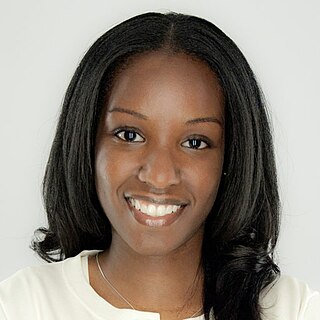
Stacey Finley is the Nichole A. and Thuan Q. Pham Professor and associate professor of chemical engineering and materials science, and quantitative and computational biology at the University of Southern California. Finley has a joint appointment in the department of chemical engineering and materials science, and she is a member of the USC Norris Comprehensive Cancer Center. Finley is also a standing member of the MABS Study Section at NIH. Her research has been supported by grants from the NSF, NIH, and American Cancer Society.
Andrea P. Belz is an American innovation engineer, academic and author. She is a Professor of Practice in Industrial and Systems Engineering and the Vice Dean of Transformative Initiatives in the Viterbi School of Engineering at the University of Southern California (USC).
Suparna Bhattacharya is an Indian computer scientist known for her contributions to the Linux kernel, and also interested in applications of big data in artificial intelligence. She is an Hewlett Packard Enterprise Fellow at Hewlett Packard Labs.












